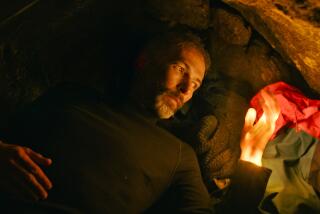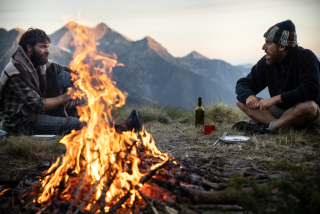Emotional ‘Mountain’ Tells of World War II Heroism
- Share via
Beth and George Gage’s “Fire on the Mountain,” which launches the Grande 4-Plex’s “Documentary Days” series, is a most unexpected movie, as unusual in its subject matter as in its impact. It calls attention to the U.S. Army’s 10th Mountain Division and the crucial role it played in World War II, showing how its men were transformed by their experiences and how they have made crucial contributions to American life over the past half century. “Fire on the Mountain” sneaks up on you; you could never guess at the outset that it would be so stirring.
“Fire on the Mountain” will be followed by “Troublesome Creek,” a portrait of a Midwestern farming family; “Predictions of Fire,” a look at the avant-garde art movement in Slovenia; “Champagne Charlie,” a study of controversial industrialist Charles Bedaux; and “Kids of Survival,” an account of how a program in art training impacts a group of ghetto youth. Each film will play one week.
Less than a month before Pearl Harbor, Charles Minot Dole, who had created the National Ski Patrol in 1937, succeeded in persuading President Roosevelt to establish a military ski-mountain climbing patrol, which he believed could be crucial should the U.S. enter World War II. A number of the world’s finest skiers signed up, plus many others. All went off to Camp Hale in the Colorado mountains for a training regimen that would be marked by its sheer ruggedness and by its extraordinary camaraderie and equality among its men.
The highlight of the training program was a six-week ordeal in which the men had to survive in sub-zero weather, an exercise considered the most grueling in all of World War II. The Camp Hale experience also yielded such inventions as the snowmobile and nylon rope for mountain climbing.
Amazingly, “Fire on the Mountain” gives us the impression that virtually everything that happened at Camp Hale was filmed, from maneuvers to off-duty high jinks. This gives the Georges much with which to work as they interweave the recollections of many veterans, most of whom ski to this day.
*
For quite awhile, it looked as if the men of the 10th might never see action. But in December 1944, they were shipped to Italy to rout the Germans from the Apennines, a monumental undertaking, also well-documented on film. It began with a surprise attack but evolved into a brutal, deadly ordeal lasting the duration of the war in Europe. At this point, “Fire in the Mountain” shifts gears deftly, and, before we realize it, we’re experiencing the full measure of American heroism in World War II. “Fire in the Mountain” becomes a tremendous emotional experience because along the way we’ve gotten to know so many of the veterans.
It brings back those times when we could be unashamedly patriotic and profoundly proud of our military men and their sacrifices and accomplishments. World War II continues to lodge in our collective consciousness as our finest hour. Older white males in American society have been criticized so often and for so long as insensitive chauvinist pigs it is heartening to see an array of men of such clear-cut decency, bravery and unpretentiousness.
The Georges might well have concluded their film with victory in World War II. But they proceed to show us how a significant number of these men went on to play major roles in the sporting and skiing industries, in promoting conservation and in making the wilderness available to the disabled.
Many of these veterans returned to the scenes of battle in 1995 to join with their former German enemies in the name of world peace while marking the 50th anniversary of the war’s end.
* Unrated. Times guidelines: The film contains some World War II battle footage too intense for small children.
‘Fire on the Mountain’
A First Run Features release of a Gage & Gage production. Producers-directors Beth Gage, George Gage. Written by Beth Gage. Cinematographer Kenneth Lehn. Editors Scott Conrad, Krysia Carter-Giez. Music Todd Barton. Narrator Steve Kanaly. Running time: 1 hour, 12 minutes.
* Exclusively at the Grande 4-Plex, 345 S. Figueroa St., downtown Los Angeles, (213) 617-0268.
More to Read
Only good movies
Get the Indie Focus newsletter, Mark Olsen's weekly guide to the world of cinema.
You may occasionally receive promotional content from the Los Angeles Times.







